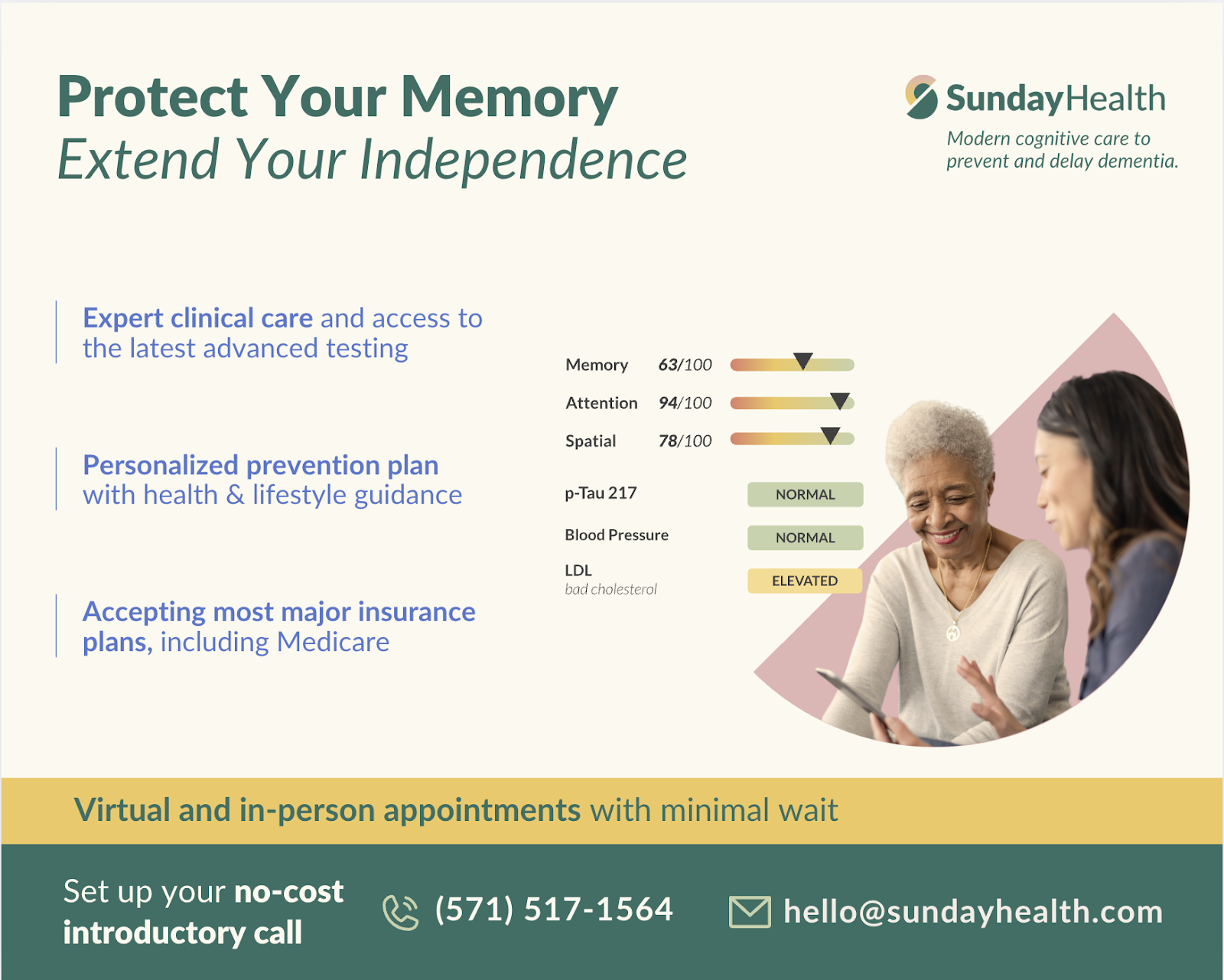Debunking Common Myths: "Once Symptoms Start, There's Nothing That Can Be Done"

Debunking Common Myths: "Once Symptoms Start, There's Nothing That Can Be Done"
Misconceptions about cognitive health – our memory and thinking abilities – and aging are widespread and often prevent people from seeking the care they need. In this four-part series, the brain health experts at Sunday Health will debunk common myths that might be standing between you and optimal cognitive wellness.
A common misconception about cognitive decline is that nothing can be done once symptoms appear. This belief often leads to unnecessary despair and inaction. In fact, early diagnosis and treatment can improve quality of life, slow progression, and help individuals and families plan for the future.
The Progressive Nature of Cognitive Decline
Alzheimer's disease and other dementias progress slowly, often over many years. This gradual progression creates opportunities for meaningful intervention at various stages.
Mild cognitive impairment (MCI), which often precedes Alzheimer's, provides a critical window for intervention. With MCI, individuals may notice slight changes in memory or thinking, but they can still function independently in daily activities. Research consistently shows that engaging in structured lifestyle interventions during this phase can reduce progression to dementia and preserve quality of life for longer periods.
Medical Interventions That Make a Difference
For years, Alzheimer’s treatments focused primarily on managing symptoms rather than the course of the disease. That changed with the FDA’s approval, just in the last two years, of two groundbreaking monoclonal antibody treatments that may slow the progression of Alzheimer's by up to 35% for some patients, with the greatest effectiveness in early stages.
Additionally, a growing body of evidence suggests that treating health conditions like high blood pressure, hearing loss, and diabetes can also slow cognitive decline. These interventions, when implemented early, can have a substantial impact on delaying and even preventing dementia. Learn more here.
Non-Medication Approaches
Even in the absence of medication, there are effective strategies to help preserve cognitive function following the onset of symptoms. Evidence supports the following approaches as beneficial to brain health, even after a diagnosis:
- Regular physical activity
- Good sleep hygiene
- Healthy eating
- Social engagement
- Cognitive training
These interventions go beyond prevention—they are critical elements of a well-rounded, evidence-based treatment plan.
The Importance of Early Planning
A timely diagnosis helps people and their families prepare for the future. This can include advance care planning, creating robust support systems, and making important financial and legal decisions while the person with the diagnosis can still meaningfully participate.
It also helps families understand what to expect and how best to support their loved one through different stages of the condition.
Support Systems and Resources
Many delay seeking help due to fear, stigma, or lack of awareness about available services. In reality, numerous supports exist, including:
- Cognitive rehabilitation therapy
- Access to care navigators who help families coordinate services
- Mental health support to cope with the emotional aspects of a diagnosis
- Caregiver education and resources to help better support their loved one while maintaining their own well-being
Clinical Trials and Research Participation
Clinical trials represent another important aspect of early intervention. Individuals with early symptoms may qualify for trials investigating new treatments or interventions.
Participating in research can offer people access to cutting-edge therapies and contribute to broader understanding and innovation in the field of cognitive health.
Emotional Benefits of Early Action
Many patients find that an early diagnosis provides a sense of relief. It validates their concerns and offers a structured plan forward. Understanding the nature of the disease, the symptoms to watch for, and the typical progression timeline can help individuals and families make informed decisions. This knowledge reduces fear and empowers people to advocate for the care they need.
The emotional benefits of acting early should not be overlooked. Knowing there is a plan in place and a team of professionals available can significantly alleviate anxiety for both patients and their families. It gives people a sense of control in what can otherwise feel like an uncertain and frightening situation.
In conclusion, the belief that nothing can be done once cognitive symptoms emerge is not supported by current evidence. Early intervention, informed decision-making, and a sustained sense of hope can all contribute to meaningful improvements in quality of life and extension of personal agency.
How Sunday Health Can Help
Sunday Health is a modern cognitive care clinic dedicated to helping individuals take a proactive approach to brain health. Our compassionate team—including cognitive neurologists, nurse practitioners, and care navigators—provides expert clinical care alongside evidence-based programs tailored for older adults to help prevent and delay cognitive decline.

We serve patients in Washington, DC, Maryland, and Virginia via convenient telehealth appointments and in-person at our office in Vienna, VA. We accept Medicare, Medicare Advantage, and most commercial insurance plans, and no referral is needed to schedule an appointment.
If you or someone you love has concerns about memory or dementia, we're here to help with compassionate, state-of-the-art care. Taking action early can make all the difference in maintaining the active, engaged lifestyle you deserve.




